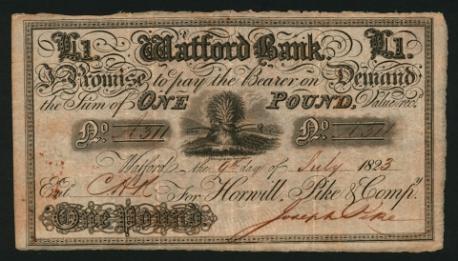 A nice article from the Australian Herald Sun: a rare complete set of the first Australian banknotes to be issued following Federation is expected to sell for 5.5 million Australian dollars or more. It is the first time a private set of eight Collins/Allen cancelled specimen banknotes has been offered for sale. The notes date from 1913 and 1914 and include a 10-shilling note as well as a 1, 5, 10, 20, 50, 100 and a 1000-pound note, which features a flock of sheep. The sale, which is expected to set a new record for a set of Australian banknotes, will mark the 100th anniversary of their printing.
A nice article from the Australian Herald Sun: a rare complete set of the first Australian banknotes to be issued following Federation is expected to sell for 5.5 million Australian dollars or more. It is the first time a private set of eight Collins/Allen cancelled specimen banknotes has been offered for sale. The notes date from 1913 and 1914 and include a 10-shilling note as well as a 1, 5, 10, 20, 50, 100 and a 1000-pound note, which features a flock of sheep. The sale, which is expected to set a new record for a set of Australian banknotes, will mark the 100th anniversary of their printing.
The notes are known as cancelled specimens because they are marked with a large "x" and are perforated with "cancelled". Such notes were sent to central banks around the world so officials could familiarise themselves with the new currency before its public release. They are named after the two secretaries to the Treasury whose signatures appear on them, James Collins and George Allen. The private sale is being organised by Western Australia's The Rare Coin Company, which has spent the past four years assembling the set on behalf of two collectors. Rare Coin Company managing director Rob Jackman said he had already fielded a number of inquiries about the sale from around the world.
A while ago I wrote a post about the large denomination notes from the USA. They go all the way up to the infamous 100.000 dollar banknote with president Woodrow Wilson at the front. It turns out that Great Britain also has a few banknotes with very high denominations.
This article on the BBC website describes the two denominations. One is a note of 1 million pounds known as a 'giant'. But even this expensive piece of paper pales in comparison to the one they call the 'titan': a banknote worth 100 million pound.
They are of course useless if you would want to spend them in a supermarket. They serve as backup for the Scottish and Irish banks who issue their own money. People using these banknotes would know their money is always backed by these giants and titans should the local bank fail.
More info on this fascinating story at the BBC website.
 The Civil War changed the country more than any other event in U.S. history, and its echoes are very much with us yet in many aspects of American life. Even the paper money we use every day is a consequence of the war.
The Civil War changed the country more than any other event in U.S. history, and its echoes are very much with us yet in many aspects of American life. Even the paper money we use every day is a consequence of the war.
Very nice article about the US banking system and the development of paper money in the 19th century. You can find the full article here.
The 200 Rand I nominated for Banknote fo the Year 2012 is now featured on the IBNS website! You can still nominate your own favourite until 31 January 2013.
 I found an interesting article on the site of LANSA, the Latin American Paper Money Society, regarding the Salta Province Bonds from Argentina. Having been issued in 1985 this was so called quasi-money which could only be used in the nothern province of Salta. I also have one in my collection which you can see here.
I found an interesting article on the site of LANSA, the Latin American Paper Money Society, regarding the Salta Province Bonds from Argentina. Having been issued in 1985 this was so called quasi-money which could only be used in the nothern province of Salta. I also have one in my collection which you can see here.
The IBNS has published the nominees so far for the Banknote of the Year 2012. The nominees are (in random order):
My personal favourite of these six nominees is the Canadian 50 Dollar which I think is beautiful and innovative. But I'm also missing the gorgeous new notes from South Africa with Nelson Mandela on the front and one of the Big Five animals on the back. So I nominated the 200 Rand note today because I think it's worth at least to be nominated (see image below).
If you also want to nominate a banknote, you can do so until 31 January 2013. Banknotes nominated must have been issued to the public (specimens and non-circulating currencies are inelligble) for the first time during 2012, and must have artistic merit and/or innovative security features.
E-mail banknoteoftheyear@ibns.biz with the details, and your membership number (if possible please include a scan of the front and back of your nomination).
 A rather funny story in New York Magazine about Jack Lew. In particular his signature. You might ask: what does it matter what the signature of the current chief of staff of president Obama looks like? Well, because mr. Lew is probably going to be the next Treasury Secretary of the United States and his signature will appear on the new dollar banknotes. So yes, it matters a little bit more than the average signature. What's so weird about it? Check for yourself in this photoshopped picture:
A rather funny story in New York Magazine about Jack Lew. In particular his signature. You might ask: what does it matter what the signature of the current chief of staff of president Obama looks like? Well, because mr. Lew is probably going to be the next Treasury Secretary of the United States and his signature will appear on the new dollar banknotes. So yes, it matters a little bit more than the average signature. What's so weird about it? Check for yourself in this photoshopped picture:
He wouldn't be the first Treasure Secretary who would change his John Hancock for his new job. The current Secretary Timothy Geithner also had to change his signature when he took up the job. You can view the before and after version in this interview. To see if any of the previous signatures were also a bit weird or ugly, you can view the entire list of signatures here.
I personally think Lew's signature is pretty cool!
Update 11-1-2013: President Obama jokes about the signature at the press conference announcing Lew's candidacy. He 'promises' that Lew will "make at least one letter legible in order not to debase our currency".
Update 12-1-2013: It just keeps on getting better. You can now see how Jack Lew would sign YOUR name by visiting this Jack Lew Signature Generator. LOL.
What is the deal with Canada's polymer money? For some reason it keeps on getting bad press and nasty comments by angry users. Some of the recent articles I wrote or gathered:
- There was the issue with the naked women on the 20 dollar which a few people found offensive for some reason. They turned out to be part of a statue commemorating fallen Canadian soldiers in France. Never let the facts get in the way of a good story, I guess.
- Melting banknotes was the next issue. Polymer notes that melt in your hand, not in your mouth. Or something like that.
- Now we also have angry shopowners who complain that some vending machines don't accept the polymer notes. There are about half a million machines in Canada that need reprogramming and the Canadians have managed to do so with about 50% of them. Nice job, considering that dummy's of the new banknotes have been sent out months ago.
- Is that all? No, the new banknotes are also KILLING US with their germs! But wait, were there no germs on the old notes? Sure, but the polymer notes stick together so when people need to separate them, they lick their fingers. More so than with the old notes it seems. And so they infect the whole world with their nasty germs. If you're scared after reading this, try looking at your keyboard and mouse under a magnifier. It's generally speaking safer to lick a toilet seat than touch your co-workers computer stuff.
If you're interested in a more positive story on polymer notes, I suggest you look at this nice article from Scientific American that provides a bit of history and background on these little germ-infested, melting and sticky pieces of plastic.
A nice article in the German newspaper Die Welt about the rigorous tests banknotes are put through before they're issued. If you click this link, the german article is automatically translated in english. If you want to read the original text in german, click here.
 That's the question Canadians are asking when reports surfaced last summer of banknotes which had melted because of exposure to heat. The notes in question were of course the new polymer notes. An woman from Ontario claimed that a few 100 Dollar bills melted together when they were stashed in her car near a heat source. Another woman claimed the same notes had melted together during a heatwave.
That's the question Canadians are asking when reports surfaced last summer of banknotes which had melted because of exposure to heat. The notes in question were of course the new polymer notes. An woman from Ontario claimed that a few 100 Dollar bills melted together when they were stashed in her car near a heat source. Another woman claimed the same notes had melted together during a heatwave.
The Canadian Press ordered internal documentation on this case from Canada's central bank. Did this provide the answer to the 'burning' question? Not quite: "In response to a formal request from The Canadian Press, the Bank of Canada released 134 pages of internal records - almost completely blanked out."
"The bank stands by its statements made this summer that polymer bank notes cannot be affected by the types and levels of heat as has been suggested in last summer's news reports, and has seen no evidence to the contrary," bank spokesperson Jeremy Harrison said. He noted the bank had performed "extensive and rigorous tests" prior to issuing the notes, including exposing them to extremes of 140 C and -75 C.
The central bank blanked out most of the texts because "Disclosing details of behind-the-scenes discussions about tales of melting banknotes could endanger national security or international relations". But the bank might have a point though regarding the durability of the new polymer notes:
Since the polymer series began circulating in November 2011, there were 232 cases of mutilated polymer notes submitted to the bank through last October, the bank says. That compares to an average of 3,000 total cases of mutilated notes per year.
The note in question:
An interesting interview with the CEO of banknote printer De la Rue Tim Cobbold.
Remember the Creede banknote I wrote about recently? It sold for a whopping $102.000!!
I think that calls for a well deserved… KA-CHING!!
 In an article in the Brazilian newspaper Folha de S. Paulo a few weeks ago it's mentioned that Brazilian prosecutor Jefferson Aparecido Dias has filed a complaint about the nations banknotes and demands that everyone of them is replaced. The reason for this claim? The sentence "Deus Seja Louvado" (God Be Praised) which appears on the banknotes from Brazil.
In an article in the Brazilian newspaper Folha de S. Paulo a few weeks ago it's mentioned that Brazilian prosecutor Jefferson Aparecido Dias has filed a complaint about the nations banknotes and demands that everyone of them is replaced. The reason for this claim? The sentence "Deus Seja Louvado" (God Be Praised) which appears on the banknotes from Brazil.
His argument is that the Brazilian state is a secular one and should refrain itself from any religious manifestation. He does acknowledge that most of Brazil is Christian but he compared it to the situation where all of a sudden Praise Allah, Praise Buddah or God Doesn't Exist would appear on the banknotes. People would be angry then, so why not protect the minority of non-Christians in Brazil in this case?
The bank’s response to the prosecutor mentioned that the state, "not being atheist, anticlerical or antireligious, can legitimately make a reference to the existence of a higher being, a divinity, as long as, in doing so, it does not make an allusion to a specific religious doctrine."
Source 1, 2
 Vietnam will withdraw the 10.000 and 20.000 Dong from 1 January 2013. This has sparked a trade in these banknotes in Vietnam. People want to buy them as a souvenir or because they think the notes will be worth much more in the future. They're being offered sometimes at four times the face value. Some people claim these banknotes are so popular because of the beautiful colors: "the VND10,000 paper note dubbed “The Queen of all VND banknotes” symbolizes luck thanks to its bright shade of red – a favorite color during Tet holiday."
Vietnam will withdraw the 10.000 and 20.000 Dong from 1 January 2013. This has sparked a trade in these banknotes in Vietnam. People want to buy them as a souvenir or because they think the notes will be worth much more in the future. They're being offered sometimes at four times the face value. Some people claim these banknotes are so popular because of the beautiful colors: "the VND10,000 paper note dubbed “The Queen of all VND banknotes” symbolizes luck thanks to its bright shade of red – a favorite color during Tet holiday."
You can read about this business in this charming article which also deals with collecting money (yaay, it's legal!) and the growing e-business in Vietnam.
After the Creede banknote, I found another article with an old banknote from a bank which no longer exists today. This is the 1 Pound note from the Watford Bank issued in the UK in 1823. It is part of the collection of property investor David Kirch. His collection will be auctioned in 4 parts at Spink.
Watford Bank was founded in 1823 - during the reign of King George IV, formerly the Prince Regent - and went bust in 1826, as many of the English provincial banks did at this time. It was run by three local businessmen - Joseph Pike, William Horwill and Thomas Pike. In fact, it is Joseph Pike’s handwritten signature which appears in the bottom right hand corner of the pound note coming up for sale next week.
The note is expected to sell for around £300-£400.
Source
« Vorige Pagina |
Toon berichten 91-105 van 121 |
Volgende Pagina »
 A nice article from the Australian Herald Sun: a rare complete set of the first Australian banknotes to be issued following Federation is expected to sell for 5.5 million Australian dollars or more. It is the first time a private set of eight Collins/Allen cancelled specimen banknotes has been offered for sale. The notes date from 1913 and 1914 and include a 10-shilling note as well as a 1, 5, 10, 20, 50, 100 and a 1000-pound note, which features a flock of sheep. The sale, which is expected to set a new record for a set of Australian banknotes, will mark the 100th anniversary of their printing.
A nice article from the Australian Herald Sun: a rare complete set of the first Australian banknotes to be issued following Federation is expected to sell for 5.5 million Australian dollars or more. It is the first time a private set of eight Collins/Allen cancelled specimen banknotes has been offered for sale. The notes date from 1913 and 1914 and include a 10-shilling note as well as a 1, 5, 10, 20, 50, 100 and a 1000-pound note, which features a flock of sheep. The sale, which is expected to set a new record for a set of Australian banknotes, will mark the 100th anniversary of their printing.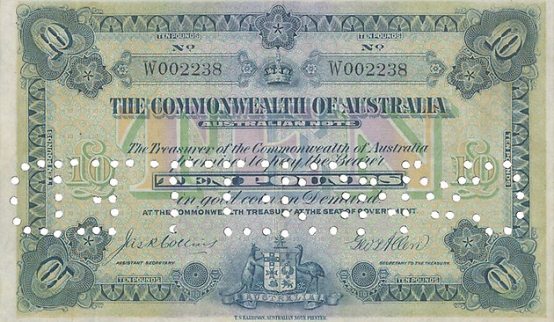
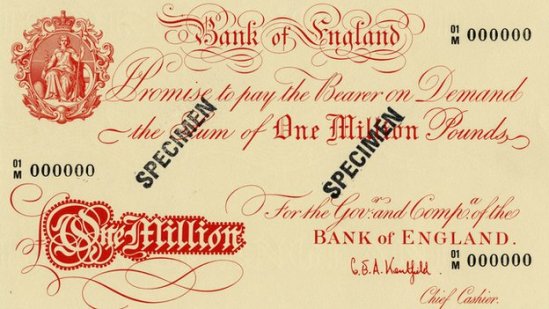
 The Civil War changed the country more than any other event in U.S. history, and its echoes are very much with us yet in many aspects of American life. Even the paper money we use every day is a consequence of the war.
The Civil War changed the country more than any other event in U.S. history, and its echoes are very much with us yet in many aspects of American life. Even the paper money we use every day is a consequence of the war.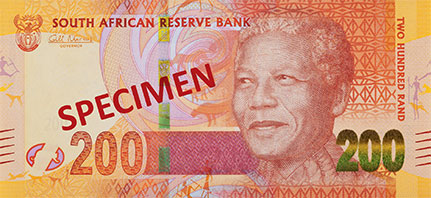
 I found an interesting
I found an interesting 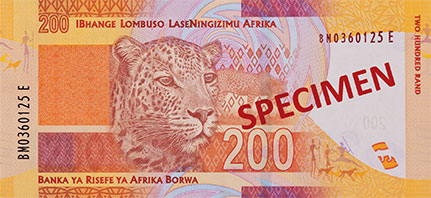
 A rather funny story in
A rather funny story in 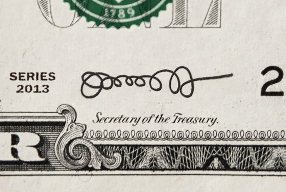
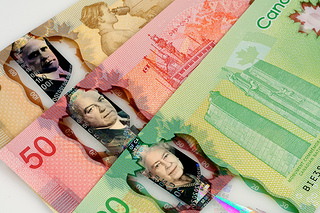
 That's the question Canadians are asking when
That's the question Canadians are asking when 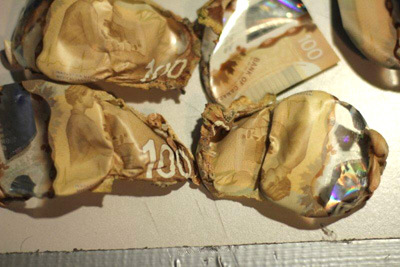
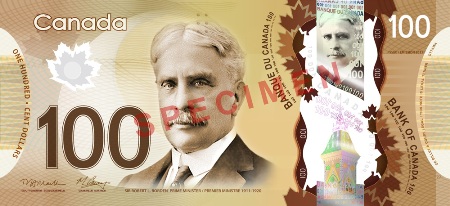
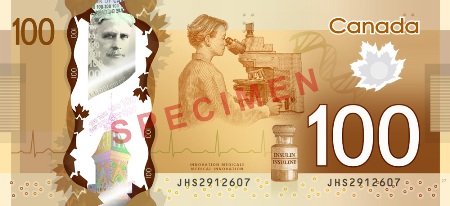
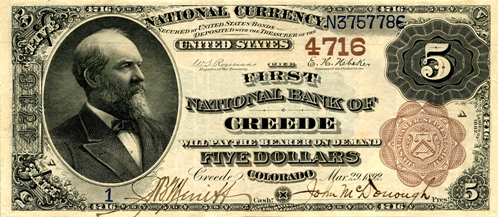
 In
In 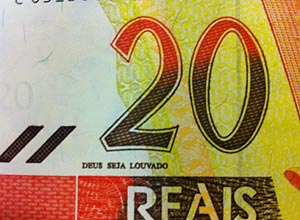
 Vietnam will withdraw the 10.000 and 20.000 Dong from 1 January 2013. This has sparked a trade in these banknotes in Vietnam. People want to buy them as a souvenir or because they think the notes will be worth much more in the future. They're being offered sometimes at four times the face value. Some people claim these banknotes are so popular because of the beautiful colors: "the VND10,000 paper note dubbed “The Queen of all VND banknotes” symbolizes luck thanks to its bright shade of red – a favorite color during Tet holiday."
Vietnam will withdraw the 10.000 and 20.000 Dong from 1 January 2013. This has sparked a trade in these banknotes in Vietnam. People want to buy them as a souvenir or because they think the notes will be worth much more in the future. They're being offered sometimes at four times the face value. Some people claim these banknotes are so popular because of the beautiful colors: "the VND10,000 paper note dubbed “The Queen of all VND banknotes” symbolizes luck thanks to its bright shade of red – a favorite color during Tet holiday."
